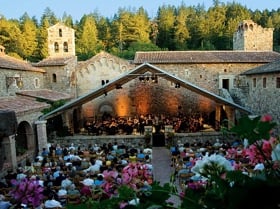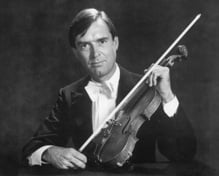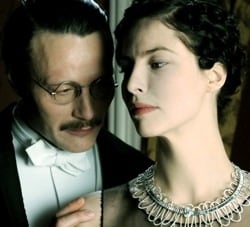Festival del Sole to Shine Again
Napa's Festival of the Sun will have its fifth season, July 16-25, with its usual star-studded list of artists. Returning to the Festival's various scenic venues are Joshua Bell, Jean-Yves Thibaudet, Chris Botti, Francesco Demuro, Omer Wellber, Nina Kotova, Carlo Ponti, Nikki Yanofsky, Conrad Tao, and Kelly O'Connor.

In a festival first, there will be a ballet gala, featuring dancers from American Ballet Theater and the Bolshoi and Kirov ballets. There will be a visual arts exhibit of works by William Wegman, a reading by Rita Moreno, a free concert series highlighting emerging artists, and the return of the Russian National Orchestra.
The RNO will be in residence for the next four seasons of the festival, through 2013. The four-year commitment was made possible in part by a donation from Tatiana and Gerret Copeland, proprietors of Bouchaine Vineyards.
This year, Robert Cole, former director of Cal Performances at UC Berkeley, joins the festival team as Festival Advisor. Festival Director Richard Walker says:
Five years ago we set out to create a festival combining the best in music, art, food, and wine. And we have done just that. Today Napa Valley Festival del Sole has become one of the country’s leading summer music festivals.

The season opens with a July 16 concert at Napa Valley Opera House, with Conrad Tao and the RNO Four Strings in Mozart's Piano Concerto No. 12, K. 414; and soloists Maxim Rubtsov and Vladislav Lavrik in Bolling’s Suite for Flute and Jazz Piano, and Toot Suite for Trumpet and Jazz Piano.
On July 17, Far Niente, celebrating the winery’s 125th anniversary celebration, hosts performances by jazz trumpeter Chris Botti and violinist Joshua Bell.
On July 18, Lincoln Theater Napa Valley is the venue for the U.S. debut of Omer Wellber, recently named to follow Lorin Maazel as principal conductor of Palau de les Arts Reina Sofia in Valencia, Spain. Wellber leads the RNO, Joshua Bell, and pianist Jean-Yves Thibaudet in a program that includes Mendelssohn’s Double Concerto.
Jean-Yves Thibaudet and Nina Kotova join the Rossetti String Quartet for chamber music at Castello di Amorosa on July 20. Renowned for its sophisticated, sensual sound, the Rossetti String Quartet is a frequent collaborator of the virtuoso French pianist.
Tickets go on sale April 1 for purchase on line or by calling 888-FDS-NAPA [(888) 337-6272].
Malan, Avedis at the Legion
 California Symphony and San Francisco Ballet Concertmaster Roy Malan is the guest soloist in the Avedis Chamber Music Series on April 3 at the Legion of Honor, as the series celebrates its 25th anniversary.
California Symphony and San Francisco Ballet Concertmaster Roy Malan is the guest soloist in the Avedis Chamber Music Series on April 3 at the Legion of Honor, as the series celebrates its 25th anniversary.Malan is performing with Avedis regulars Alexandra Hawley (flute), Paul Hersh and Susan Freier (violas), and Stephen Harrison (cello) in a program of diverse and rarely performed music by Ferdinand Ries (Quartet in C Major), Max Reger (Serenade in G Major), Katherine Hoover (Divertimento), and Andreas Jakob Romberg (Quintet in E Minor).
Tickets are $15-$20, including admission to the museum.
Stravinsky et al. at SFIFF-53
The French film Coco Chanel and Igor Stravinsky begins with the famous/infamous riot during Igor Stravinsky’s 1913 premiere of The Rite of Spring, and then moves into "a moodily intense, sumptuously detailed drama evokes a pivotal era of upheaval in Western culture by focusing on two of its most famous protagonists."

Jan Kounen's 2009 film is scheduled to have its U.S. first screening at the 53rd San Francisco International Film Festival, April 22 through May 6, at the Sundance Kabuki Cinemas and other theaters. (Coco will be screened at the Kabuki at 12:30 p.m. on April 25 and at 9:15 p.m. on April 26.)
The festival will present 177 films from 46 countries, with 250 filmmakers as guests. Other music-related films:
Pianomania — about Stefan Knüpfer, the Steinway & Sons master piano tuner doubling as physician and voice coach. Participating artists include Pierre-Laurent Aimard, Alfred Brendel, Lang Lang, Aleksey Igudesman, Richard Hyung-Ki Joo, and Stephan Knüpfer. (Screened at the Pacific Film Archive on April 25 and April 29, and on May 2 at the Kabuki.)
Satyajit Ray's masterwork The Music Room (1958) — about a turn-of-the-century Indian aristocrat whose wealth is dwindling but who continues to spend money on lavish concerts in his opulent jalsaghar (music room). With the participation of Vilayat Khan, Asis Kumar, Robin Majumder, and Dakhin Mohan Takhur. The work of Satyajit Ray occupies a special place in the history of SFIFF: His first film, Pather Panchali, had its U.S. premiere at the first Festival in 1957. (Screened at the Castro Theater on May 1 and on May 2 at the Pacific Film Archive.)
Jandó Recital
Hungarian piano virtuoso Jenő Jandó is giving a recital at 8 p.m. on April 15 in the Green Room of the Veterans Building. The program includes works by Chopin and Schumann. For information about tickets, call (415) 309-0341.Jandó, a professor at Liszt Academy Budapest, is first-prize winner of the Hungarian Piano Concours as well as in the chamber-music category at the Sydney International Piano Competition. He has recorded for Naxos all the piano concertos and sonatas of Mozart, along with Grieg and Schumann concertos, the complete piano sonatas of Haydn and Beethoven, the complete piano music of Bartók, and a wide repertoire of chamber music.
American Bach Finale
Performing Bach, Handel, and Vivaldi, the American Bach Soloists will give the season's final concerts, April 16-19 in four Bay Area venues. Conducted by Jeffrey Thomas, and featuring Mary Wilson (soprano), Johanna Novom (violin), and Corey Jamason (harpsichord), the concerts' program includes Bach’s Concerto in A Minor for Violin and Concerto in D Minor for Harpsichord; Handel's Delirio amoroso, and Vivaldi's In furore iustissimae irae.
Condemi Named Artistic Director in Santa Barbara
Merola Program participant and locally active stage director José Maria Condemi has been named artistic director of Opera Santa Barbara, to work alongside General Director Steven Sharpe. The Argentine artist directed the Lyric Opera of Chicago's Tristan und Isolde and Ernani.
At San Francisco Opera, Condemi directed Tosca, Così fan tutte, and The Elixir of Love. In Seattle, he led La bohème and Il trovatore, and has conducted numerous productions with Canadian Opera, Minnesota Opera, Cincinnati Opera, Portland Opera, and others.
Condemi's collaborations with contemporary opera composers include directing the workshop premiere of the San Francisco Opera commission Earthrise by Lewis Spratlan, as well as Hector Armienta's River of Women and The Weeping Woman. His theater directing credits include Caryl Churchill's Mad Forest, Dürrenmatt's The Physicists, and Lorca's The House of Bernarda Alba.
This summer, Condemi directs SFO's Faust with Patricia Racette, and Madama Butterfly with Daniela Dessi; Atlanta Opera's Così fan tutte; and a new production of Carmen for Lake George Opera.
Could Musical Ignorance Be Bliss?
Reading program notes or preparing for a concert or opera may be detrimental to your musical health, suggests a university researcher. [NOTE to readers: I am just reporting this, see?]
She is Elizabeth Hellmuth Margulis of the University of Arkansas, and she avers that "Descriptions may interfere with the directness and intimacy with which listeners are able to experience a work. It may distance listeners, or place them at a remove — as if they were listening through someone else’s ear."
This new know-nothing movement started with the idea that contextual information may diminish viewers’ enjoyment of modern art. A fairly logical extension of that highly debatable theory is that this may apply to music as well.
Margulis' study, published in the Psychology of Music, says reading guides before hearing a piece of music may make the actual aesthetic experience less pleasurable.
Margulis' experiment is rather bizarre: She selected 24 excerpts from Beethoven string quartets, and for each of these 45-second snips of music, she wrote two brief descriptions: One labeled "dramatic" ("The opening evokes a deeply felt hymn"), the other "structural" ("This piece begins with a series of slow, sustained chords").
The 16 nonmusicians who participated in the experiment listened to all 24 excerpts. For eight of the pieces, they first read the dramatic description of what it was they were about to hear. For another eight, they read the structural description. The remaining eight were presented without any preparation. Afterward, the participants rated their enjoyment of each excerpt.I can accept Margulis' suggestion to have listeners let the music wash over them, but doubt a little knowledge is a dangerous — or, at least, negative — thing. I do have a somewhat similar notion in this area that newcomers to opera often get bogged down, and distanced, by the libretto. There is something to be said for just allowing the music in."Excerpts without descriptions were enjoyed more than excerpts with them," Margulis writes. "Dramatic descriptions seemed to reduce enjoyment more than structural descriptions, but this effect did not rise to significance."
Is it possible the test participants were simply annoyed by the instruction to read the description, which influenced how they perceived the piece? Possibly, but a follow-up experiment determined any such effect did not account for the difference in enjoyment levels.
At any rate, Margulis does not say program notes and preconcert lectures should be abandoned, admitting that her study is preliminary and "raises more questions than it answers."
